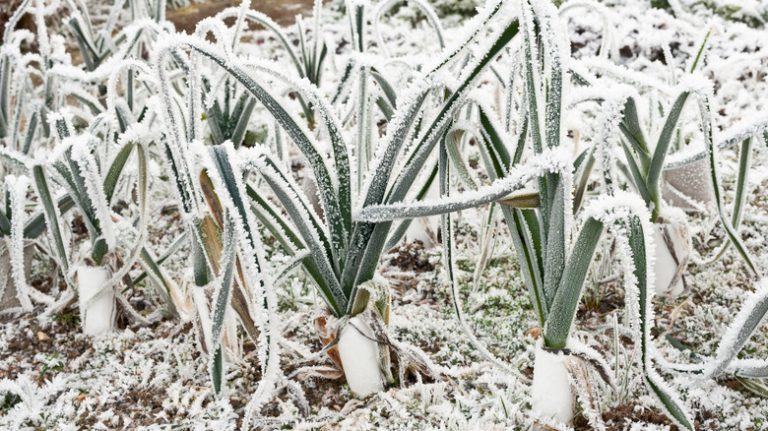Olive, sunflower, canola, coconut, and soybean are popular vegetable oil types, and at least one of them is probably in your pantry right now. While sautéing, frying, and roasting are how many utilize these greases, they also have many great purposes outside of the kitchen. You can use your vegetable oil to maintain the garden, clean up messes, lubricate items, complete renovations, and do many more tasks around the house.
Vegetable oil is non-toxic, safe for non-sensitive skin, and has natural moisturization properties. Plus, it is not only fresh canola that you can put to work, as your leftover oil from frying also has a destiny that’s more important than the trash bin. Instead of disposing of the cooking oil, repurposing it is a stellar way to be more eco-friendly. You’ll also save it from accidentally going down the drain and clogging it. With all the ways you can use vegetable oil, cooking with it might move to the last place on your list.
Eliminate garden pests
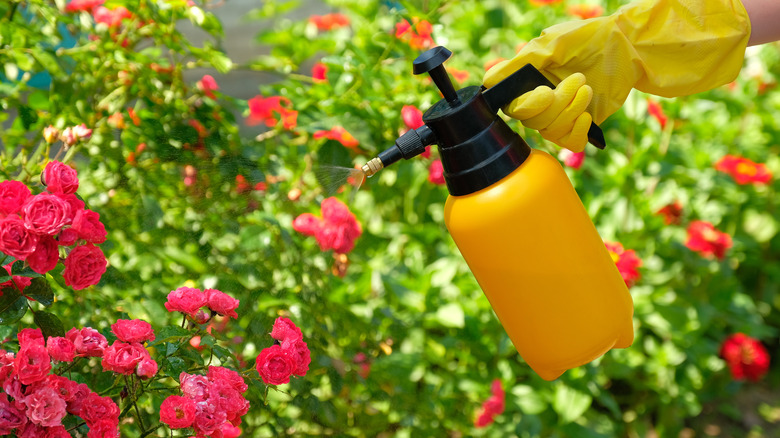
Vegetable oil and a mild soap are the perfect base for a homemade pesticide. The mixture is deadly for aphids, mites, and thrips — common insects that terrorize your garden. You’ll need 1 cup of oil and 1 tablespoon of liquid soap that have been shaken together. Then, when the critters come, dilute 2 tablespoons of the oil-soap solution with 1 quart of water and spray the infected plants. The oil will suffocate the pests, and they will be no more.
Create an emergency lamp
Vegetable oil can replace the kerosene in your vintage lantern or hurricane lamp. If desired, you can use used oil for this trick; just make sure to filter out food particles by running it through a fine mesh strainer or cheesecloth. You can even DIY a vegetable oil lamp with a non-flammable container like glass, a wick, and a wick holder. Fill the jar with the oil, add the wick, and prop it above the fuel with the holder. This will provide you with light in case of an emergency.
Polish wood furniture
Delmaine Donson/Getty Images
You can make a homemade wood polish using vegetable oil. You’ll also need either lemon juice or white vinegar, as these ingredients will act as a preservative. If you’re using lemon juice, make sure it is freshly-squeezed, and half a cup of the citrus mixed together with 1 cup of oil will do. For the vinegar-oil combo, you only need 1 tablespoon of vegetable oil and 1 cup of vinegar. Mix thoroughly with either recipe and use sparingly. Dap a little on a cloth and apply it to your finished wood furniture or floors to give them some shine.
Shine stainless steel
Xefstock/Getty Images
Wood isn’t the only thing that gets a glossy finish with vegetable oil, as your stainless steel appliances will shine, too. After cleaning and degreasing your stovetop or refrigerator, polish it with oil to create a water-repellent barrier and sparkling coat. Dab your vegetable oil onto a paper towel or cloth and lightly rub the steel surface in the direction of the metal’s natural lines. Now both your wooden tabletop and steel hardware look like new.
Get paint off your skin
Paul Bradbury/Getty Images
Vegetable oil helps remove stubborn paint that’s stuck to your skin. Use a generous amount to coat the dried-on paint and scrub. Then, let the oil sit for a few minutes before wiping with a paper towel and rinsing with water. Repeat the process until all the paint is gone. Keep in mind that natural pigments and oil-based paints will be harder to remove than water-based ones.
Clean up candle wax
Gabi D/Shutterstock
Whether you’re cleaning out a candle jar to reuse the glass or have drips of wax on your furniture, vegetable oil comes in handy. Let 1 teaspoon sit on the stain for a few minutes to dissolve the hardened wax, then wipe off the oil with a wet cloth and clean any greasy residue with dish soap and water. If there are any wax remnants, use a spoon or butter knife to gently scrape them off.
Grease door hinges
monte_a/Shutterstock
Squeaky door hinges won’t make a sound after vegetable oil gets through with them. Dab a few drops of oil onto a cloth and shine the hinges, rubbing every nook. It will lubricate the metal, and there will be no more creepy, haunted house noises. However, the vegetable oil will wear off eventually, and you will need to reapply it.
Unstick zippers

Pheelings media/Shutterstock
Vegetable oil is a great lubricant to make zippers unstuck. Dip a cotton swab in the oil and run it along the teeth of the zipper, making sure to coat the back, front, and fastener head until the zipper starts moving again. However, be mindful to use a little at a time and apply the oil with caution. Runway drops can stain certain fabrics, especially those made of natural fibers.
Remove stickers
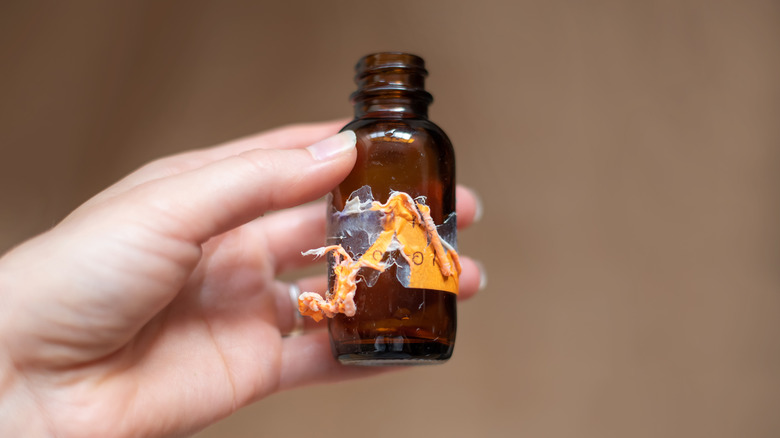
Rebeca Bolanos/Shutterstock
Food labels, price tags, duct tape — sometimes they leave behind glue residue that is hard to remove. Luckily, vegetable oil and a paper towel are all you need to get rid of the sticky mess. Soak the towel in the oil and let it rest on the residue for a few minutes. The oil will dissolve the adhesive much like it does with candle wax. Then, you can remove any excess grease with dish soap and water.
Coat garden tools
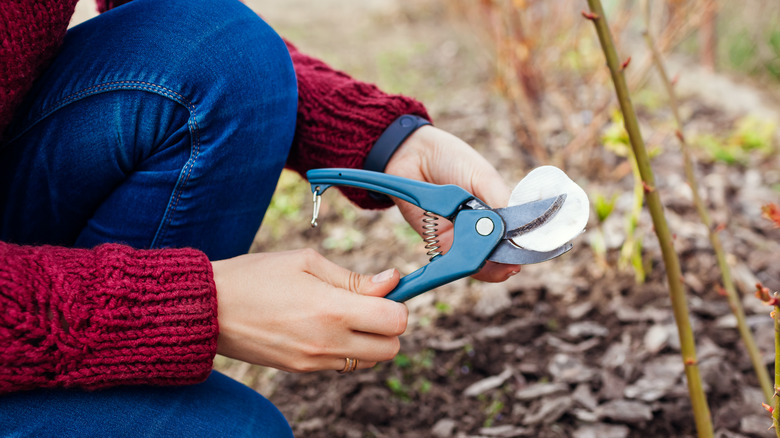
Maryviolet/Getty Images
After you clean and disinfect your gardening tools, oiling them will prevent rust from forming. Apply vegetable oil to a cloth and use it to rub the metal surface of your rakes, shovels, pruning shears, and other equipment. You want enough oil to coat the front, sides, and back but not too much to where the item is soaked. You can also use the oil to lubricate the tool’s hinges and polish wood handles to curb splintering.
Revamp roof shingles
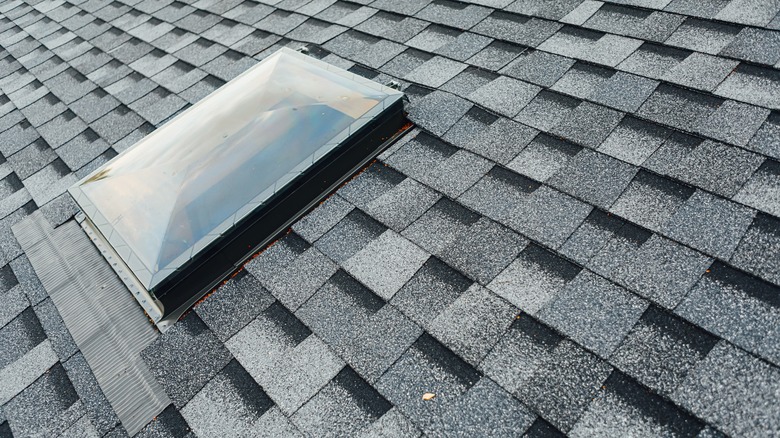
nikkytok/Shutterstock
If you have asphalt roof shingles, used vegetable oil can help bring them back to life. You will need a lot of oil — around 1 gallon for every 250 square feet of roofing. First, heat the used oil, let it cool, and strain it before staining. You can apply an even coat to the shingles using a paintbrush, spray, or roller to moisturize the material and extend its life. Ensure your roof is clean and dry, all holes are sealed, and broken shingles are replaced before applying the oil. A weekend with no forecasted rain is the best time to revamp your roof.


